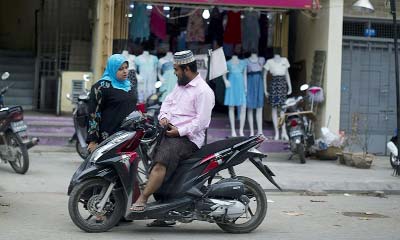
AFP, Mandalay :
With a smile, Myanmar’s most notorious Buddhist monk boasts of the sleepless nights he endures on his self-appointed quest against the country’s Muslims – one that he claims has helped strip voting rights from hundreds of thousands of the religious minority.
Wirathu, whose anti-Muslim campaign has stoked religious tensions in the Buddhist-majority nation, said he spends most nights at his tranquil Mandalay monastery glued to his computer screen, streaming images from some of the world’s most violent Islamic terrorist organisations.
He then posts messages to his 91,000 Facebook followers, helping foment the idea that Buddhism is under threat.
“Many days I don’t sleep at all,” the monk, who goes by one name, told AFP, adding his work is so arduous that he lacks the time enjoyed by President Thein Sein and opposition leader Aung San Suu Kyi to “have family meals and put on make-up”.
Myanmar’s Muslims, who make up at least five per cent of the 51-million population, have a long history of involvement in public life.
But they have faced increasing marginalisation under the current quasi-civilian government that replaced junta rule in 2011.
Recent years have also seen bouts of deadly anti-Muslim violence and there are fears the spread of hate speech could trigger further troubles in the run-up to the nation’s landmark November 8 election.
Wirathu, whose soft voice belies the vitriol behind his words, is the best known member of an alliance of monks who have inserted their hardline stance into Myanmar’s mainstream politics.
He was jailed in 2003 for inciting religious tension under the former military rulers. But their successors have appeared keen to allow his brand of nationalist Buddhism to flourish.
He claimed “victory” for pressuring government to push controversial laws through parliament – which rights groups say discriminate against women and religious minorities – and helping to snatch voting rights from hundreds of thousands of Muslim Rohingya in strife-torn Rakhine state.
In March Myanmar revoked temporary identification documents – a move affecting hundreds of thousands of Rohingya, who have since been stripped of voting rights after parliament banned people without full citizenship from voting.
Observers say both Suu Kyi’s opposition National League for Democracy and Myanmar’s ruling party have bowed to the hardliners, declining to field Muslim candidates for polls seen as a crucial test of democratic progress.
The move risks leaving non-Rohingya Muslims who are entitled to vote without Muslim candidates to back at the polls.
A senior Muslim NLD member told AFP that “not a single Muslim” was among more than 1,000 party candidates for the upcoming elections – the first it has fought for 25 years.
Suu Kyi “must be afraid” of the monks, the source said on condition of anonymity.
With a smile, Myanmar’s most notorious Buddhist monk boasts of the sleepless nights he endures on his self-appointed quest against the country’s Muslims – one that he claims has helped strip voting rights from hundreds of thousands of the religious minority.
Wirathu, whose anti-Muslim campaign has stoked religious tensions in the Buddhist-majority nation, said he spends most nights at his tranquil Mandalay monastery glued to his computer screen, streaming images from some of the world’s most violent Islamic terrorist organisations.
He then posts messages to his 91,000 Facebook followers, helping foment the idea that Buddhism is under threat.
“Many days I don’t sleep at all,” the monk, who goes by one name, told AFP, adding his work is so arduous that he lacks the time enjoyed by President Thein Sein and opposition leader Aung San Suu Kyi to “have family meals and put on make-up”.
Myanmar’s Muslims, who make up at least five per cent of the 51-million population, have a long history of involvement in public life.
But they have faced increasing marginalisation under the current quasi-civilian government that replaced junta rule in 2011.
Recent years have also seen bouts of deadly anti-Muslim violence and there are fears the spread of hate speech could trigger further troubles in the run-up to the nation’s landmark November 8 election.
Wirathu, whose soft voice belies the vitriol behind his words, is the best known member of an alliance of monks who have inserted their hardline stance into Myanmar’s mainstream politics.
He was jailed in 2003 for inciting religious tension under the former military rulers. But their successors have appeared keen to allow his brand of nationalist Buddhism to flourish.
He claimed “victory” for pressuring government to push controversial laws through parliament – which rights groups say discriminate against women and religious minorities – and helping to snatch voting rights from hundreds of thousands of Muslim Rohingya in strife-torn Rakhine state.
In March Myanmar revoked temporary identification documents – a move affecting hundreds of thousands of Rohingya, who have since been stripped of voting rights after parliament banned people without full citizenship from voting.
Observers say both Suu Kyi’s opposition National League for Democracy and Myanmar’s ruling party have bowed to the hardliners, declining to field Muslim candidates for polls seen as a crucial test of democratic progress.
The move risks leaving non-Rohingya Muslims who are entitled to vote without Muslim candidates to back at the polls.
A senior Muslim NLD member told AFP that “not a single Muslim” was among more than 1,000 party candidates for the upcoming elections – the first it has fought for 25 years.
Suu Kyi “must be afraid” of the monks, the source said on condition of anonymity.

